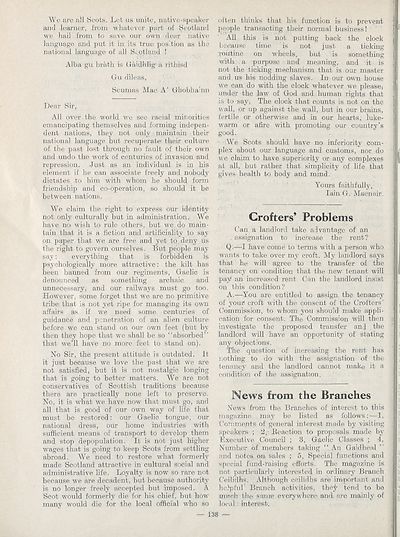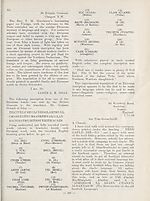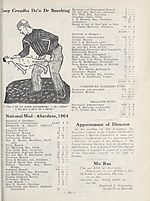An Comunn Gàidhealach Publications > Gaidheal > Volumes 58--62(part), January, 1963--March 1967
(390) Page 138
Download files
Complete book:
Individual page:
Thumbnail gallery: Grid view | List view

We are all Scots. Let us unite, native-speaker
and learner, from whatever part of Scotland
we hail from to save our own dear native
language and put it in; its true position as the
national language of all Scotland !
Alba gu brath is Gaidhlig a rithisd
Gu dileas,
Seumas Mac A’ Ghobha'nn
Dear Sir,
All over the world we see racial minorities
emancipating themselves and forming indepen¬
dent nations, they not only maintain their
national language but recuperate^ their culture
of the past lost through no fault of their own
and undo the work of centuries of invasion and
repression. Just as an individual is in his
element if he can associate freely and nobody
dictates .to him with whom he should form
friendship and co-operation, so should it be
between nations.
We claim the right to express our identity
not only culturally but in administration.: We
have no wish to rule others, but we do main¬
tain that it is a fiction and artificiality to say
on paper that we are free and yet to deny us
the right to govern ourselves. But people may
say: everything that is forbidden is
psychologically more attractive: the kilt has
been banned from our regiments, Gaelic is
denounced as something archaic and
unnecessary, and our railways must go too.
However, some forget that we are no primitive
tribe that is not yet ripe for managing its own
affairs as if we need some centuries of
guidance and penetration of an alien culture
before we can stand on our own feet (but by
then they hope that we shall be so “absorbed”
that we’ll have no more feet to stand on).
No Sir, the present attitude is outdated. It
it just because we love the past that we are
not satisfied, but it is not nostalgic longing
that is going to better matters. We are not
conservatives of Scottish traditions because
there are practically none left to preserve.
No, it is what we have now that must go, and
all that is good of our own way of life that
must be restored: our Gaelic tongue, our
national dress, our home industries with
sufficient means of transport to develop them
and stop depopulation. It is not just higher
wages that is going to keep Scots from settling
abroad. We need to restore what formerly
made Scotland attractive in cultural social and
administrative life. Loyalty is now so rare not
because we are decadent, but because authority
is no longer freely accepted but imposed. A
Scot would formerly die for his chief, but how
many would die for the local official who so
often thinks that his function is to prevent
people transacting their normal business!
All this is not putting back the clock
because time is not just a ticking
routine on wheels, but is something
with ; a purpose and meaning, and it is
not the ticking mechanism that is our master
arid us his nodding slaves. In our own house
we can do with the clock whatever we please;
under the law of God and human rights that
is to say. The clock that counts is not on the
wall, or up against the ’wall, but in our brains,
fertile or otherwise and in our hearts, luke¬
warm or afire with promoting our country’s
good.
We Scots should have no inferiority com¬
plex about our language and customs, nor do
we claim to have superiority or any complexes
at all, but rather that simpheity of life that
gives health to body and mind.
Yours faithfully,
Iain G. Macnair.
Crofters’ Problems
Can a landlord take advantage of an
. assignation to increase the rent?
Q.—I have come to terms with a person who
wants to take over my croft. My landlord says
that he will agree to the transfer of the
tenancy on condition that the new tenant will
pay an increased rent Can the laridlord insist
on this condition?
A.—You are entitled to assign the tenancy
of youil croft with the consent of the Crofters’
Commission, to whom you should make appli¬
cation for consent. The Commission will then
investigate the proposed transfer anj the
landlord will have an opportunity of stating
any objections.
The question of increasing the rent has
nothing to do with the assignation of the
tenancy and the landlord cannot make it a
condition of the assignation.
News from the Branches
News from the Branches of interest to this
magazine may be listed as follows:—1,
Cofnments of general interest made by visiting
speakers ; 2, Reaction to proposals made by
Executive Council ; 3, Gaelic Classes ; 4,
Number of, members taking ‘ ‘ An Gaidheal
and notes on sales ; 5, Special functions and
special fund-raising efforts. The magazine is
not particularly interested in ordinary Branch
Ceilidhs, ; Although ceilidhs are important and
helpful Branch activities, they fend to be
much the same everywhere and are mainly of
local interest.
and learner, from whatever part of Scotland
we hail from to save our own dear native
language and put it in; its true position as the
national language of all Scotland !
Alba gu brath is Gaidhlig a rithisd
Gu dileas,
Seumas Mac A’ Ghobha'nn
Dear Sir,
All over the world we see racial minorities
emancipating themselves and forming indepen¬
dent nations, they not only maintain their
national language but recuperate^ their culture
of the past lost through no fault of their own
and undo the work of centuries of invasion and
repression. Just as an individual is in his
element if he can associate freely and nobody
dictates .to him with whom he should form
friendship and co-operation, so should it be
between nations.
We claim the right to express our identity
not only culturally but in administration.: We
have no wish to rule others, but we do main¬
tain that it is a fiction and artificiality to say
on paper that we are free and yet to deny us
the right to govern ourselves. But people may
say: everything that is forbidden is
psychologically more attractive: the kilt has
been banned from our regiments, Gaelic is
denounced as something archaic and
unnecessary, and our railways must go too.
However, some forget that we are no primitive
tribe that is not yet ripe for managing its own
affairs as if we need some centuries of
guidance and penetration of an alien culture
before we can stand on our own feet (but by
then they hope that we shall be so “absorbed”
that we’ll have no more feet to stand on).
No Sir, the present attitude is outdated. It
it just because we love the past that we are
not satisfied, but it is not nostalgic longing
that is going to better matters. We are not
conservatives of Scottish traditions because
there are practically none left to preserve.
No, it is what we have now that must go, and
all that is good of our own way of life that
must be restored: our Gaelic tongue, our
national dress, our home industries with
sufficient means of transport to develop them
and stop depopulation. It is not just higher
wages that is going to keep Scots from settling
abroad. We need to restore what formerly
made Scotland attractive in cultural social and
administrative life. Loyalty is now so rare not
because we are decadent, but because authority
is no longer freely accepted but imposed. A
Scot would formerly die for his chief, but how
many would die for the local official who so
often thinks that his function is to prevent
people transacting their normal business!
All this is not putting back the clock
because time is not just a ticking
routine on wheels, but is something
with ; a purpose and meaning, and it is
not the ticking mechanism that is our master
arid us his nodding slaves. In our own house
we can do with the clock whatever we please;
under the law of God and human rights that
is to say. The clock that counts is not on the
wall, or up against the ’wall, but in our brains,
fertile or otherwise and in our hearts, luke¬
warm or afire with promoting our country’s
good.
We Scots should have no inferiority com¬
plex about our language and customs, nor do
we claim to have superiority or any complexes
at all, but rather that simpheity of life that
gives health to body and mind.
Yours faithfully,
Iain G. Macnair.
Crofters’ Problems
Can a landlord take advantage of an
. assignation to increase the rent?
Q.—I have come to terms with a person who
wants to take over my croft. My landlord says
that he will agree to the transfer of the
tenancy on condition that the new tenant will
pay an increased rent Can the laridlord insist
on this condition?
A.—You are entitled to assign the tenancy
of youil croft with the consent of the Crofters’
Commission, to whom you should make appli¬
cation for consent. The Commission will then
investigate the proposed transfer anj the
landlord will have an opportunity of stating
any objections.
The question of increasing the rent has
nothing to do with the assignation of the
tenancy and the landlord cannot make it a
condition of the assignation.
News from the Branches
News from the Branches of interest to this
magazine may be listed as follows:—1,
Cofnments of general interest made by visiting
speakers ; 2, Reaction to proposals made by
Executive Council ; 3, Gaelic Classes ; 4,
Number of, members taking ‘ ‘ An Gaidheal
and notes on sales ; 5, Special functions and
special fund-raising efforts. The magazine is
not particularly interested in ordinary Branch
Ceilidhs, ; Although ceilidhs are important and
helpful Branch activities, they fend to be
much the same everywhere and are mainly of
local interest.
Set display mode to:
![]() Universal Viewer |
Universal Viewer | ![]() Mirador |
Large image | Transcription
Mirador |
Large image | Transcription
| An Comunn Gàidhealach > An Comunn Gàidhealach Publications > Gaidheal > Volumes 58--62(part), January, 1963--March 1967 > (390) Page 138 |
|---|
| Permanent URL | https://digital.nls.uk/127153461 |
|---|
| Description | This contains items published by An Comunn, which are not specifically Mòd-related. It includes journals, annual reports and corporate documents, policy statements, educational resources and published plays and literature. It is arranged alphabetically by title. |
|---|
| Description | A collection of over 400 items published by An Comunn Gàidhealach, the organisation which promotes Gaelic language and culture and organises the Royal National Mòd. Dating from 1891 up to the present day, the collection includes journals and newspapers, annual reports, educational materials, national Mòd programmes, published Mòd literature and music. |
|---|---|
| Additional NLS resources: |
|

